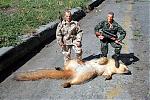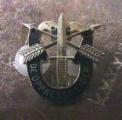Easy for you to say. I believe the reality is different and I for one certainly agree with what he wanted to do in 2001 versus what anyone says today. Regardless, it is a fact that had we not stayed...I understand the thought process on the part of the "fpe," its hangers-on and fellow travelers that led to our staying. I have no question that going into Afghanistan in 2001 was really necessary, not just desirable -- and that on both strategic and tactical bases. We went in the and the guys did well and then, as I said "Unfortunately, G. W. Bush, good Christian he, was convinced by a number of the humanitarianly inclined foreign policy 'elite' ( "fpe" - lower case, advisedly...) in Washington to stay and bring a failed State into the World Community." That was a poor decision, understandable on the face but wrong on the strategic merits in almost all senses. I've been watching and participating in that foolishness for a good many years. It is terribly flawed logic and does more harm than good, almost always.There was no chance we weren't going to stay in Afghanistan in some measure after the anti-Taliban forces kicked out the Taliban with the help of US airpower. It was felt that one of the primary reasons 9-11 came was because AQ found a congenial home in Taliban run Afghanistan and one of the primary reasons Taliban was running Afghanistan was because we stopped paying attention to the place after the Soviets left. So we were going to stay on.
The "fpe" and it's allies are some conflicted folks. They espouse humanitarian interventions to protect the locals from themselves and then want to dictate how said locals behave. Fascinating. To say we, the US should dictate to folks that certain "...things should be done as we wish you to do them is in your best interest and that's why we came here to save you" would be knee slapping hilarious if it weren't so sad and didn't do so much damage to the US and to the locals the "fpe" crowd wants to save. I become more convinced as time passes that all that is less about 'saving' others than it is about dictating to others how they should behave in a "Nanny knows best" mode and an effort to make themselves feel better.
Other nations have a right to their interests and way of life and it is not up to us to prescribe nirvana. Bob's World is correct, we need to break that foolish, dangerous and ill affordable addiction. The World has changed and we are way behind the power curve.So? Trick to that is to make your raids hurt more than theirs, easily done -- unless the raiding instrument either (a) gets bogged down or (b) is so poor at execution that it fails to achieve a required level of hurt. Of those, 'b' is a capability issue and we have deliberately not developed that as fully as we should due to the "fpe" objecting to that as 'not nice' (and the ostensible leaders of the raiders being unduly risk averse in the upper -- not the lower, actually do it -- echelons).If we hadn't stayed on, the Taliban would have been back shortly since they just moved across the border. That would have amounted to trading a raid for a raid leading to more raids probably. Sort of medieval.
Far more regrettably, 'a' is often a conscious decision will fully undertaken for dubious reasons as opposed to being an inadvertent occurrence. That would be the Afghan issue...I believe there are several stretches of reality there. Inimical is an opinion, we can differ. Criticality to NATO survival is also an opinion and we differ on that as well.I don't think NATO's involvement is inimical to NATO's interests at all. It is critical if NATO is to survive as an alliance. Refusal of the alliance to support its most important member in the face of an attack would have meant the end of the alliance. Involvement in Afghanistan may be inimical to individual country's interests, but to the alliance, no.
Stretching Article 5 as the US did and you support was IMO very ill advised. I will certainly acknowledge that, since we stayed, it was politically a smart move on several levels and that is in some senses beneficial to the alliance. That does not make the staying beneficial to us or the alliance.
You seem to be an interventionist as are many members of the "fpe." While I have no problem with intervening or with violence if the results will be beneficial for the US, I strongly object to such activity when the results will be detrimental and / or the cost benefit ratio is quite poor -- not a little poor but quite poor. I even more strongly object when the nominal results are unachievable or will do more long term harm to the US and when the cost-benefit ratio is quite averse. If as is often the case it can be reliably predicted that such interventions will likely worsen the state of the local populace then the action is even more objectionable. That was and is the case in Afghanistan and is also the case with Libya. The "fpe" OTOH relishes interventions that spread sweetness and light and 'improve' the state of the masses as they see it. They're most always wrong. That, again, was and is the case in Afghanistan and is also the case with Libya.
The "fpe" and the pro intervention always crowd, accompanied and encouraged by those in the DoD and DoS establishments that see such efforts as budget, power and prestige enhancing who ally with them and come up with some really fascinating rationales to justify them -- and expand them with mission creep beyond all recognition or logic. JFK's rather foolish "...bear any burden..." collection of bravely spoken words have much to answer for.













Bookmarks